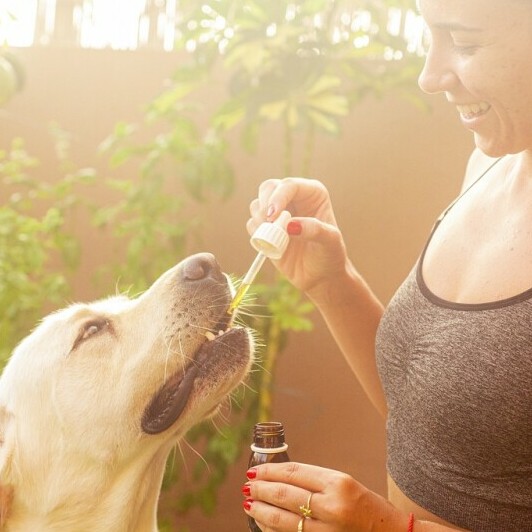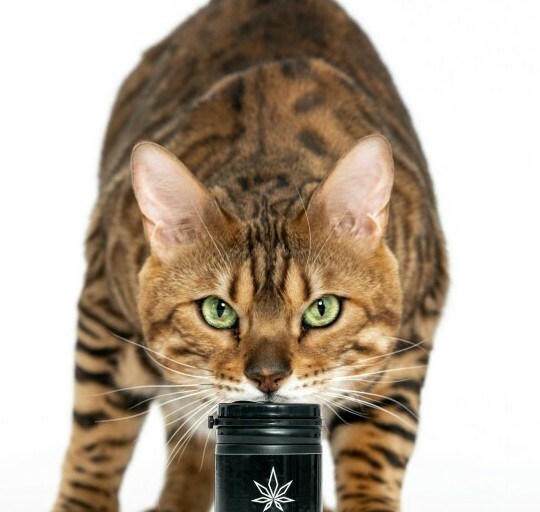Hey, it’s Bob here, and I recently explored a method of alternative care for my Puppy. You might remember, Puppy is breezing through her 13th year – wow, 13 years! – and still has that youthful spirit, eager for a good wrestle and bravely defending her turf from my Kitty’s playful ambushes. But, as she’s getting on in years, I’m aware of the aches and pains that come with age. So, in my quest to ensure her twilight years are as comfortable as possible, I’ve delved into the world of non-traditional care, found some great information as well as full product line from my new friends at King Kanine, landing on one option that’s caught my attention: CBD oil for dogs and cats.
So what is CBD oil for dogs and cats? Let’s break it down. CBD, short for cannabidiol, is one of the many compounds found in the cannabis plant. Unlike its cousin THC (tetrahydrocannabinol), which causes the high we often associate with marijuana, CBD is non-psychoactive. That means it can provide potential health benefits without any intoxicating effects – ideal for maintaining Puppy’s sprightly demeanor without any unwelcome side effects.
I’ve discovered that CBD oil comes as a specialized, concentrated liquid extract, where the CBD is usually mixed with a carrier oil like hemp seed oil or coconut oil. You can find it in tinctures, capsules, treats, and even topical creams designed for our furry friends. It’s becoming a big deal in pet care circles, gaining traction as more pet parents seek out natural remedies that can be gently integrated into their pets’ daily lives.
CBD’s entry into the pet care market isn’t just a passing fad. It stems from a genuine desire by pet owners to explore natural solutions to improve the quality of life for their aging companions. In the next section, we’re going to zero in on exactly what this means for dogs and cats in terms of health benefits. And you know what? The list of potential perks is quite impressive.
The Promise of CBD Oil in Pet Care: Exploring the Benefits
If you’re like me, seeing your furry friend in any sort of discomfort is the last thing you want. That’s precisely why I got curious about the benefits of CBD oil for dogs and cats. From what I’ve gathered, there’s a reasonably impressive laundry list of potential health perks.
First up, let’s talk about pain relief. CBD oil has analgesic properties that may help take the edge off your pet’s aches and pains, especially for seniors like Puppy who might be dealing with arthritis or old injuries. Imagine being able to offer her a little extra comfort without resorting to heavy medication.
Anxiety can be a huge concern too. My Puppy doesn’t love thunderstorms, and I know she’s not alone in her stress. CBD oil is being picked up by many pet owners for its calming effects. It might just make those loud booms a little less terrifying, or help with separation anxiety when you’re away from home.
Now, seizures are a serious business. If you’re dealing with a pet who’s suffering from epilepsy or other seizure-inducing conditions, CBD might offer you a glimmer of hope. While it’s not a cure-all, there’s evidence to suggest it can reduce the frequency and intensity of seizures.
Inflammation isn’t just about swelling – it can contribute to a range of issues. CBD’s anti-inflammatory properties may help with everything from allergies to inflammatory bowel disease. And for the outer layer, it might soothe your pet’s skin irritations, giving them that much-needed relief.
For any pet going through treatments like chemotherapy or struggling with digestive problems, CBD could be a game changer in controlling nausea and stimulating appetite. After all, a good meal is part of the joy of life, right?
Age may bring wisdom, but it can also bring joint stiffness and reduced mobility. CBD may help improve the quality of daily walks and playtime by targeting inflammation and supporting joint health, keeping your senior pet more active and happier.
Lastly, even if your pet isn’t dealing with specific health concerns, a daily dose of CBD oil might operate much like a multivitamin for humans – a supplementary step to promote overall health and vitality. Choose something that resonates with you and your pet’s lifestyle and see if it adds value to their well-being.
In my experience, it’s been a journey of understanding how these natural alternatives might offer support where traditional paths may fall short. In the next section, I’m going to dig into precisely why CBD oil for pets is becoming a go-to choice for pet parents. Stay tuned.

The Rise of CBD Oil for Pets: Understanding the Popularity
That’s right, the demand for CBD oil in the pet world is skyrocketing. But this isn’t just a passing trend. This surge in popularity comes from pet owners who are desperate for safer, more natural options for their furry friends. Let’s take a look at why people are turning to this ancient plant extract for modern pet problems.
One key factor is the push for natural alternatives. You’re likely aware of the skepticism around traditional pharmaceuticals, especially when it comes to side effects and long-term impacts. CBD oil, derived from hemp, offers a solution that aligns more with the holistic approach many prefer—it’s a natural supplement that can enhance your pet’s health without the heavy pharmaceutical footprint.
Ease of use is a big deal too. Pet owners love that CBD oil is not only effective but also simple to give to their pets. Whether it’s mixed in with their food, infused in their treats, or administered directly, it’s fuss-free. And if you’ve ever tried giving a cat a pill, you know ‘fuss-free’ is golden!
There’s also the fact that you can find CBD products designed for pets pretty much everywhere now. From online boutiques to brick-and-mortar pet shops, there’s a plethora of options available. That’s going to include tinctures, capsules, treats, and even creams. This accessibility is crucial; it enables pet owners to explore and easily integrate CBD into their pets’ health regimen.
Anecdotal evidence and shared success stories are powerful influencers. As you might know, the scientific research on CBD for pets is catching up, but in the meantime, the positive feedback from other pet owners can be compelling. They tell stories of transformation—less anxiety, decreased pain, improved mobility—that not only tug at the heartstrings but offer hope.
Let’s not overlook the legal landscape. With hemp-derived CBD being legal in many regions—provided it contains less than 0.3% THC—there’s less worry about navigating the complexities that come with cannabis-related products. This gives pet owners the confidence to choose CBD while staying on the right side of the law.

Safely Incorporating CBD into Your Pet’s Routine: Best Practices
Before you start your pet on a CBD regimen, it’s critical to focus on the quality and source of the products you’re using. Selecting a high-quality CBD oil from reputable brands like King Kanine, which provide third-party lab results, can make all the difference in ensuring your pet’s safety and the effectiveness of the treatment.
Consulting with a veterinarian who has experience with CBD products can be invaluable. They can offer guidance on the correct dosage based on your pet’s specific health needs, size, and weight. Remember, what works for one pet might not necessarily be the right fit for another.
Monitor your pet’s responses after administering CBD oil. Just like humans, pets can have individual reactions, and side effects, though rare, can occur. These might include drowsiness, dry mouth, or an upset stomach. If you notice any adverse effects, it’s essential to adjust the dosage or consult your vet for advice.
Be mindful of the potential interactions between CBD oil and any other medications your pet is currently taking. Drug interactions can affect how your pet’s medications work and potentially lead to unwanted side effects.
Lastly, don’t forget to keep up with the legal considerations of using CBD products. While CBD oil derived from hemp with less than 0.3% THC is federally legal in the United States, state laws can differ. Stay informed and compliant with your local laws to avoid any complications.
